A Daring Rescue under Fire.

The early morning light glittered on the whirling propellers of 48 82nd FG P-38J Lightnings as they taxied for takeoff at Foggia-11/ Vincenzo airfield in southern Italy. “Tail-end Charlie” in group commander Col. Litton’s flight was Flight Officer Dick Andrews, a 100-hour P-38 pilot who had celebrated his 20th birthday the day before and was looking forward to his first strafing mission. Just behind in the pack of Lightnings was 23-year-old Capt. Richard “Dick” Willsie, the 96th FS’s operations officer and one of the most experienced pilots in the group, for whom this would be his second shuttle mission to Russia. Neither could know that this mission— Willsie’s 60th and Andrews’ 10th— would enter the history books in a way that has only been matched twice since. Following D-Day, June 6, 1944, the air war in southeastern Europe reached a crescendo as the strategic bombing campaign of the 15th Air Force struck the Ploesti oil refineries and other important targets in the region. With the promised Soviet ground offensive hitting Germany’s Eastern European allies, it looked as though the Eastern Front would crack, leading to Germany’s defeat.
Commencing in 1943, Gen. Henry “Hap” Arnold, commander of the Army Air Forces, had tried to get Stalin to allow AAF bombers to fly from England and Italy to the Soviet Union on “shuttle” raids that allowed them to bomb previously unreachable targets. If the shuttle raids could be carried out successfully, it was hoped this would lead to the use of bases in Siberia for bombing Japan. The Soviets had erected roadblock after roadblock, delaying the possibility of such operations through months of negotiating.
Bu hikaye Flight Journal dergisinin 2019 Special Issue: WWII Air War sayısından alınmıştır.
Start your 7-day Magzter GOLD free trial to access thousands of curated premium stories, and 9,000+ magazines and newspapers.
Already a subscriber ? Giriş Yap
Bu hikaye Flight Journal dergisinin 2019 Special Issue: WWII Air War sayısından alınmıştır.
Start your 7-day Magzter GOLD free trial to access thousands of curated premium stories, and 9,000+ magazines and newspapers.
Already a subscriber? Giriş Yap

Keeping 'em Flying!- The new generation of warbird pilots, restorers and mechanics
The new generation of warbird pilots, restorers and mechanics. Nearly 80 years after the end of World War II, the fighters, bombers, and trainers that defended freedom continue to enthrall and inspire audiences at airshows, thanks to generations of warbird pilots, maintainers, restoration specialists and collectors. In our September, 2022 issue we introduced you to the young warbird pilots, maintainers and restorers who are already beginning to displace more "experienced" warbird fliers and fixers.

The Corsair Maker- Bringing the Vought Corsair to the fleet was a daunting challenge that spanned nearly three years.
When the first production Corsairs exited the Stratford factory in June 1942, Guyton, as seen here, was tapped to manage the flight and production test program. Armament was improved to six wing-mounted .50s, displacing the wing fuel tanks now placed forward of the cockpit which necessarily was moved rearward by 32 inches. Overall length was increased, armor plate added, landing, arresting and tail gear improved, aileron control enhanced, and a new version of the R2800 engine was incorporated. But those significant improvements unearthed numerous idiosyncrasies that would take an extended period to make the Corsair acceptable for carrier operations
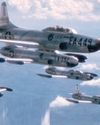
STARFIRES Over Korea
F-94 pilots tangle with MiGs
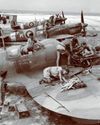
Training Mission
BY THE TIME THIS TRAINING SCENE WAS RECORDED in Canne, Italy, in July 1944, Allied Yugoslavian airmen had several years of experience working side by side with the RAF.
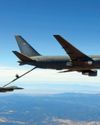
KC-46A PEGASUS
Next generation aerial refueler
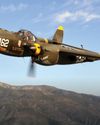
"SATAN'S ANGELS" ACE - Tales from a P-38 pilot in the South Pacific
\"AS A KID GROWING UP on the bow of my father's tugboat, hauling oil from Seattle to Alaska, I had a lot of time on my hands.
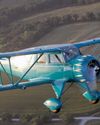
WACO YKC - Stunning and Ultra Rare Golden Age Cabin Flier
BETWEEN THE IMPLEMENTATION of the Air Commerce Act of 1926 and December 31, 1948, all U.S. registered flying machines sported an N-number, much as they do today, the \"N\" being an internationally recognized identifier for the United States. During that period, however, an additional letter-identifier followed the \"N.\" Depending on their category, they were registered in the NC (Commercial), NG (Glider), NL (Limited), NR (Restricted, usually meaning race airplanes), NS (State government), and, finally, NX (experimental).
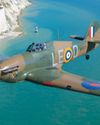
BADER'S HURRICANES
Double amputee fighter ace Douglas Bader and his Battle of Britain Hurricanes
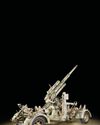
Scourge of the Allied Fighters
IT HAD TO BE THE MOST HELPLESS FEELING in the world: you're at 25,000 feet over Europe knowing that your primary function is to drop bombs-or flying escort for the bombers while being a slow-moving target for some of the world's finest shooters. However, you have John Browning's marvelous .50 caliber invention to give some degree of protection. Unfortunately, you're absolutely helpless against flak. Piloting and gunnery skills play no role in a game where sheer chance makes life and death decisions. For that reason, the Krupp 88 mm Flak 18/36/37 AA cannon could be considered WW II's ultimate stealth fighter. You never saw it coming.
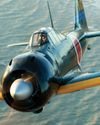
ZERO MYTH, MYSTERY, AND FACT
A test pilot compares the A6M5 Zero to U.S. fighters